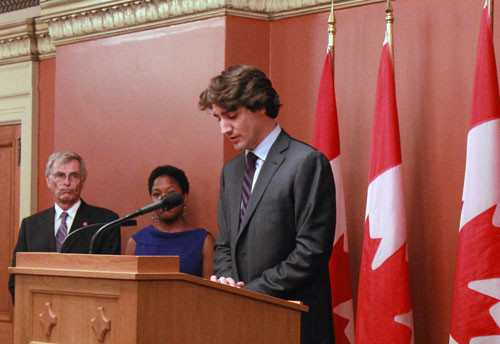June 23, 2015
LIBERAL DEM-REF PACKAGE IS TIMELY
By Andrew Cardozo

Liberal plan would restore democratic balance
Rather than pushing through a single-minded policy, the rules of democracy always need to be set by the people through some kind of meaningful consultation and dialogue.
By ANDREW CARDOZO |
Published: Monday, 06/22/2015 12:00 am EDT
Hill Times
When Pierre Poilievre pushed the Fair Elections Act though Parliament, there were two troubling aspects. First were the changes that would, among other things, limit the powers of Elections Canada and limit the ability of some voters to vote—in the name of fighting fraud where no fraud had ever existed.
But equally troubling was the lack of pushback from Canadians. The government successfully limited public consultation while opposition parties tried valiantly but could not get enough support to stop the government in its tracks.
You have to think that, at some level, the Conservative government made the political calculation that Canadians either don’t care or don’t understand these issues.
A few weeks ago I wrote a column in this space suggesting a royal commission on democratic reform that would deal with these issues and number of problem areas—a comprehensive review.
So naturally I was pleased to see Justin Trudeau announce his new policy for a “fair and open government” last week.
Besides the 32 issues which form a fulsome list of outstanding problem areas is the idea of a national dialogue on democratic reform. Rather than pushing through a single-minded policy, the rules of democracy always need to be set by the people through some kind of meaningful consultation and dialogue.
It is easy to confuse the population with too much detail or to attract people with populist and unrealistic slogans, such as “Triple-E Senate,” “Abolish the Senate” or “souveraineté-association” for that matter!
It appears that what the Liberal plan will do is address a series of issues on many fronts and launch a special House committee to examine the reform of our electoral system—how we elect MPs. They will take about a year to engage Canadians—a year-long national dialogue on how we reform the electoral system. It will be useful for the committee to consider a number of the other issues that have been identified, such as the role of Elections Canada and reforming the process of Senate appointments. All related.
Following this, a Liberal government would introduce a bill with the new system for electing the House of Commons.
Trudeau’s list of 31 other changes include the following:
Open and transparent government
• Improving access to government information, which has become more secretive than ever before. The number of public servants in communications branches has ballooned while communications with the public has been seriously curtailed.
• More access to information about expenditures of Parliament and parliamentarians.
• A more open system of Parliament and law-making
• More free votes, stronger parliamentary committees, mandatory consultation for Supreme Court appointments, an end to the monumental omnibus bills that have become so common and disallow public analysis before the laws go into effect, and real independence for the independent parliamentary watchdogs and the parliamentary budget officer. And my favourite—improving Question Period. Bringing Grade 1-style decorum to QP would do more for the reputation of politics than any other single reform. All this would require a PMO that is severely less controlling than the present one.
• Reforming the way senators are appointed and the way in which the Senate operates. This is in contrast to the NDP’s promise to abolish the Senate, which will require a considerable amount of federal-provincial wrangling.
Electoral reform
• The Liberals are promising a new system of voting, which will be based on ranked ballots or proportional representation as an electoral system (they have not dictated a preference), and mandatory voting and/or online voting so as to increase voting levels.
• Other measures would strengthen the independence of Elections Canada, whose powers were pointedly cut back in the ironically named “Fair Elections Act” of last year.
• A new advertising commissioner would prevent a government from using public money to run partisan ads.
• An independent commission to run the leaders’ debates
• A focus on getting youth registered to vote and voting in greater numbers.
Evidence-based policy development
• This will include reinstating the long-form census, un-muzzling scientists and creating a Chief Science Officer—a clear antithesis to the current approach, which almost denies that science exists.
Improved government service
• Ending the war on charities that differ with the government and which result in severe audits of the targeted groups.
• Gender-based analysis in government policy, more cultural and indigenous diversity in government appointments and more use of technology in government communication and consultation with the public.
Some of this is returning a democratic balance to Canadian democracy after four bruising years of “strong stable Conservative majority government.” To be sure, they never promised to be democratic, consultative, collaborative or fair.
If there were to be a Liberal or NDP government, Canadians have reason to expect a more cooperative Parliament, as this is a platform that both parties could readily embrace, more or less.
Andrew Cardozo is president of the Pearson Centre, an independent progressive think tank.
news@hilltimes.com
The Hill Times



